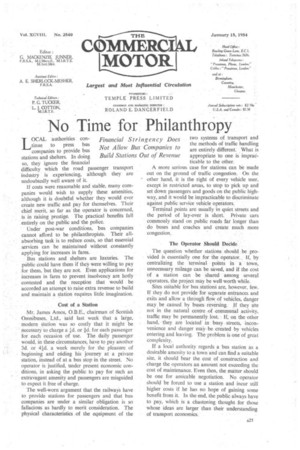• No Time for Philanthropy
Page 27

If you've noticed an error in this article please click here to report it so we can fix it.
• LOCAL authorities continue to press bus companies to provide bus stations and shelters. In doing so, they ignore the financial difficulty which the road passenger transport industry is experiencing, although they are undoubtedly well aware of it. If costs were reasonable and stable, many companies would wish to supply these amenities, although it is doubtful whether they, would ever create new traffic and pay for themselves. Their chief merit, so far as the operator is concerned, is in raising prestige. The practical benefits fall entirely on the public and the police.
Under post-war conditions, bus companies cannot afford to be philanthropists. Their allabsorbing task is to reduce costs, so that essential services can be maintained without constantly applying for increases in fares. Bus stations and shelters are luxuries. The public Could have them if they were willing to pay for them, but they are not. Even applications for increases in fares to prevent insolvency are hotly contested and the reception that would be accorded an attempt to raise extra revenue to build and maintain a station requires little imagination.
Cost of a Station Mr. James Amos, O.B.E., chairman of Scottish Omnibuses, Ltd., said last week that a large, modern Station was so costly that it might be necessary to charge a id. or id for each passenger for each occasion of use. The daily passenger would, in these circumstances, have to pay another 3d. or 41d. a week merely for the pleasure of • beginning and ending his journey at a private station, instead of at a bus stop in the street. No operator is justified, under present economic conditions, in asking the public to pay for such an extravagant amenity and passengers are misguided to expect it free of charge.
The well-worn argument that the railways have to provide stations for passengers and that bus companies are under a similar obligation is so fallacious as hardly to merit consideration. The physical characteristics of the equipment of the two systems of transport and the methods of traffic handling are entirely different. What is appropriate to one is impraCticable to the other.
A more serious case for stations can be made out on the ground of traffic congestion. On the other hand, it is the right of every vehicle user, except in restricted areas, to stop to pick up and set down passengers and goods on the public highway, and it would be impracticable to discriminate against public service vehicle operators.
Terminal points are usually in quiet streets and the period of lay-over is short. Private cars commonly stand on public roads far longer than do buses and coaches and create much more congestion.
The Operator Should Deckle The question whether stations should be provided is essentially one for the operator., If, by centralizing the terminal points in a town, unnecessary mileage can be saved, and if the cost of a station can be shared among several operators, the project may be well worth while.
Sites suitable for bus stations are, however, few. If they do not provide for separate entrances and exits and allow a through flow of vehicles, danger may be caused by buses reversing. If they ate not in the natural centre of communal activity, traffic may be permanently lost,' if if; on the other hand, they are located' in busy streets, inconvenience and danger maY, be created by vehicles entering and leaving. Th& problem is one of great complexity.
If a local authority regards a bus station as a desirable amenity to a town and can find a suitable site, it should bear the cost of construction and charge the operators an amount not exceeding the cost of maintenance. Even then, the matter should be one for amicable negotiation. No operator should be forced to use a station and incur still higher costs if he has no hope of gaining some benefit from it. In the end, the public always have to pay, which is a chastening thought for those whose ideas are larger than their understanding of transport economics.




































































































